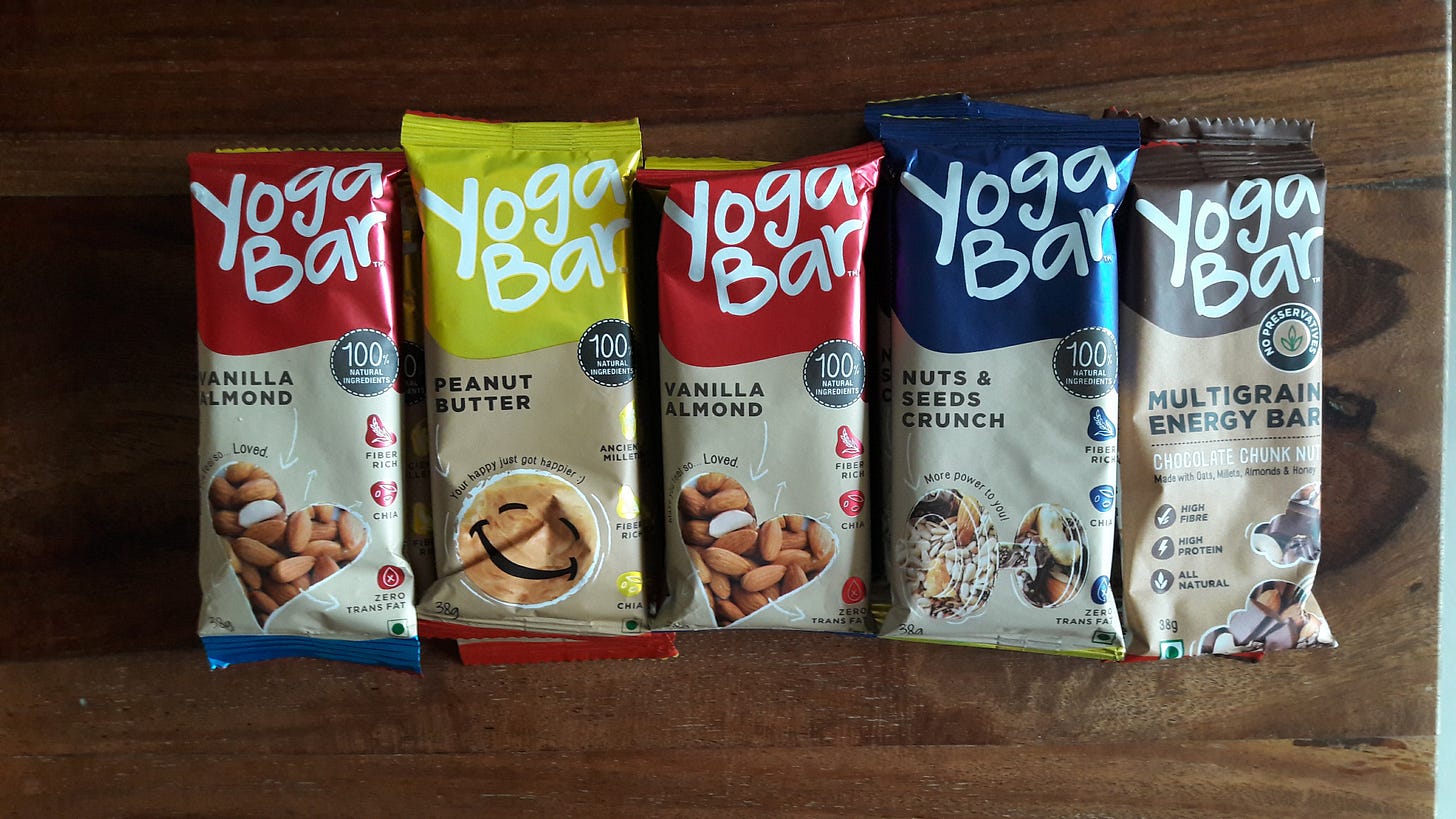Yoga Bar, an Indian food union in a snack bar
Reviewing a five-year snack bar and health food brand
I first found and bought Yoga Bars a day before running at the Airtel Delhi Half Marathon 2016, seeing them with other snack bars at a Delhi food store. As those were early days for Yoga Bar, the brand promoted sales by sampler boxes of different variants and free cloth bags to carry the bars. I used the bars before and after my run and, having picked the product's pamphlets, gave those to my acquaintances who like exploring new products. One of them ordered the product online, the easiest way to shop for Yoga Bars then (and even now), and enjoyed the product.
In February 2017, before another marathon, I again purchased Yoga Bars, by when the price had increased from INR 35 per 38 gm. bar to INR 40. I again used the snack before and during my run and found they are a good energy source in an instant that is light and chewy.
Yoga Bar's founders, sister, Aninditha, and Suhasini, modeled their product after typical Energy or Cereal, or Fruit Bars they had eaten during their stays in the United States. However, Yoga Bars have their charm, unlike other imported or local products of their kind. Like many new Indian brands, Yoga Bar is a quirky brand that has created a niche by focusing on simplicity.
Though snack bars were uncommon in India until this century, there has been a profusion of brands in the category vying for consumer attention and wallet share in recent years. Among them, Yoga Bars stand out by their union of a foreign concept with mostly local ingredients.
Yoga bars have non-local or imported ingredients like chocolate, chia seeds, and cranberry but have used native Indian foods creatively in their snack bar. Firstly, they have millets which are common staples of farming communities. Millets are now getting more popular for their health benefits and are ideal snack bars for healthy eating.
Further, ingredients like sesame, a calcium-rich seed, and coconut oil that are now receiving rave reviews worldwide make Yoga Bars a creative Indian snack. They also use brown rice, which with its fiber is healthier than polished or white rice. However, as Yoga bars have no preservatives and a 3-month shelf-life, their manufacturer must frequently be dealing with product returns post expiry.
Yoga Bars are free of any processed sugars, artificial colors or flavors, and preservatives. Instead, its manufacturer uses honey and dates as sweeteners for the bars which taste mildly sweet. As Yoga Bars do not have high fructose corn syrup sweetener and trans fatty acids in their oils, consumers concerned with those two unhealthy ingredients' health impact will be impressed.
In India, chia seeds are popular with people who follow overseas food trends where chia seeds are a wonder food. Some Yoga bars mostly have nuts, and others have a tinge of vanilla, rosemary, and orange flavors. Unfortunately, some of the brand's also flavors, such as chocolate and coffee variants, doesn't sound like healthy snacks.
Though their ingredient choice limits Yoga Bars' range, still the brand's products on offer are a pleasant surprise. The bars are soft and mildly sweet and taste like a regular Indian snack like laddoos. Also, they are light and thus an anytime meal in a pack that you can carry with you.
Yoga Bar does not advertise much and is available online and in select stores that sell high-priced and gourmet foods. Though their manufacturer claims them to be inexpensive, at INR 40 per 38 gm., they are expensive in a price-conscious market like India. Moreover, at INR 40, it is possible to have still a snack and a light meal in restaurants in cities, so Yoga Bars are unlikely to become a mass consumption item.
Yoga Bars' main draw is their local ingredients in a hygienic and dense bar, a mini-meal that is compact and easy to carry. Like many unique and beneficial brands, Yoga Bars are still very niche with limited advertising and availability. However, word-of-mouth publicity and an extension into related food categories have helped make Yoga Brands a bigger brand as of 2021, With the following foods in the range.
Muesli: They offer variants such as fruits, nuts, and seeds or dark chocolates and cranberries. They even have one with no added sugar and wholegrain muesli with almonds and quinoa for the health-conscious.
Peanut butter: Their range includes smooth, creamy, and crunchy peanut butter. You can also get peanut butter with dark chocolate, and honey roasted peanut butter.
Oats: Though Yoga Bar's plain oats variants are rolled, quick-cooking, and steel-cut oats, it also offers veggie masala, dark chocolate, and oatmeal options, with the last variant having no sugar in it.
Organic seeds: Yoga Bar now sells organic flax, chia, pumpkin, and sunflower seeds which people can consume straight or add to their food as healthier sources of fats, vitamins, and minerals.
Whey protein: At nearly five thousand for a pack, one of Yoga Bars whey protein varieties is their most expensive product and foray into one more food category. Available as a blend, concentrate or isolate, whey protein rounds up Yoga Bards six food categories.
Yoga Bar is your choice if you want an Indian food brand with a quirky name, attractive packaging, and a twist on foreign foods for local consumption. Overlooking some products with chocolates and coffee that unlikely offer health benefits, Yoga Bar's limited range is a good Indian adaptation of foreign food concepts.



